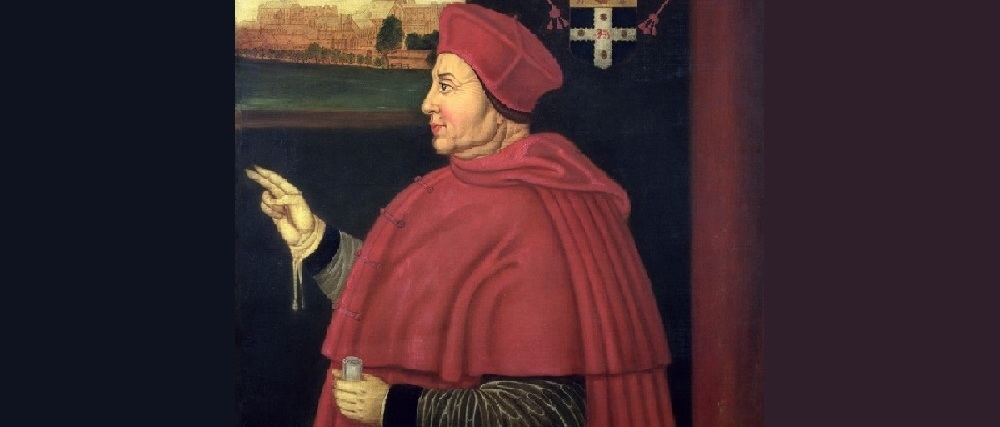Thomas Wolsey
Posted on 5th February 2021
Thomas Wolsey was born of humble beginnings around 1473 in Ipswich, Suffolk, to Robert Wolsey of Ipswich, a butcher and Joan Daundy.
Wolsey studied Theology at Magdalen College, Oxford and was ordained a priest in 1498. He held many positions before entering the service of Henry VII in 1507, where he was appointed Royal Chaplain and served as secretary to one of the Kings advisers, Richard Foxe.
Wolsey was intelligent and industrious, his ambition for power endless and he was sent on many diplomatic missions for the crown.
When Henry VIII acceded the throne in 1507 following the death of his father, Wolsey’s rise to power truly began.
Richard Foxe recommended Wolsey to Henry, who appointed him Almoner (chaplain) in 1509, which gave him access to a seat on the Privy Council (advisers to the King).
Henry was disinterested in governing the country in his early reign, preferring to spend his time on more enjoyable pursuits and Wolsey took advantage of this, building up a rapport with Henry and gaining much power over the rule of England.
Henrys advisers including his two most prominent, Richard Foxe and William Warham advised him to be cautious in his rule, however Wolsey encouraged Henry to go hunting and to enjoy himself, leaving the rule of the country to the council.
During the reign of Henry VII there was peace with France, however Henry VIII was keen to go to war with France, against the wishes of many of his advisers; Wolsey though, encouraged him and England went to war with France in 1512. This was then followed by Wolsey negotiating the Anglo-French peace treaty in 1514.
Wolsey’s rise to prominence was swift and many titles were bestowed on him.
Foxe and Warham were very much against war with France, and this issue broke down relations between Henry and the advisers, leading to their downfall and the eventual resignation of Warham as Chancellor. Wolsey was now Henrys most trusted adviser and he bestowed yet more titles and positions on him including Archbishop of Canterbury in 1514 and Lord Chancellor in 1515. He was also made a Cardinal by the Pope in 1515 and Papal Legate in 1518.
One of Wolsey’s finest achievements was the arranging of the ‘Field of the Cloth of Gold’ in 1520, a lavish display of England’s wealth and prominence to Europe and the arranging of a meeting between Henry and Francis I of France.
The elevation of Wolsey’s position in government allowed him to maintain a large household and live a lavish lifestyle, however the power he held made him increasingly unpopular with all but Henry.
At the Calais Conference in 1521 Wolsey secretly signed the Treaty of Bruges with Holy Roman Emperor Charles V, vowing to support the Roman Empire in war against France, but they later abandoned the Roman Empire, and signed a new peace treaty with France in 1527.
Pope Leo X died in 1521 and Wolsey expected the Holy Roman Emperor Charles V to support his claim to be Pope, however Charles influenced the cardinals to elect Adrian VI in 1522.
When Pope Adrian VI died in 1523, Wolsey again believed he would be elected Pope, but against his wishes the cardinals voted and elected Clement VII.
Wolsey realised that he had little support other than Henry, and even that support was to be tested, and their relationship was to change dramatically.
Henry was desperate for a son, but even though his wife Catherine was pregnant six times, a surviving son past infancy alluded Henry, and now he wanted to divorce Catherine and marry again. He believed his marriage was cursed, as Catherine had previously been married to his older brother Arthur, and he also believed his marriage was unlawful. He now required Wolsey to gain the Pope’s permission for an annulment and these proceeding started in 1527.
As Wolsey held the position of Papal Legate, Henry believed it would be easy to gain an annulment, however this was not to be the case.
Catherine’s nephew was Charles V, Holy Roman Emperor, and in support of his aunt he was against an annulment. Pope Clement VII was now in a difficult position, he was to either go against Henry or against Charles; because of this he continued to delay his decision. He was however to be heavily influenced by Charles V.
Henry and the future bride he wanted, Anne Boleyn were to doubt Wolsey’s loyalty, and this became the start of Wolsey’s downfall.
Wolsey appealed to the Pope on three separate fronts, but still the Pope would not make a decision, other than to appoint Wolsey and Cardinal Campeggio to decide the outcome.
After his arrival, Campeggio was not to be popular with Henry as he suggested to Henry that he reconcile with the Queen.
Wolsey was desperate to secure an annulment for Henry, to save his own position, however Anne Boleyn and her family continued to manipulate Henry into believing Wolsey was not sincere in this, and was deliberately slowing down the process.
In 1529 Pope Clement VII revoked Campeggio and Wolsey’s rights and cancelled the commission.
Following this, Wolsey was removed as Lord Chancellor in 1529, along with losing many other titles, he was however to retain the title of Archbishop of York.
While travelling to York, he was accused of treason and ordered to return to London. On this journey Wolsey fell ill and died at Leicester on 29 November 1530. He is buried at Leicester Abbey.
Thomas Wolsey is believed to have made the following statement on his deathbed.
‘I see the matter against me how it is framed. If I had served God as diligently as I have done the King he would not have given me over in my grey hairs’.
Tagged as: Junior Tudors
Share this post:





